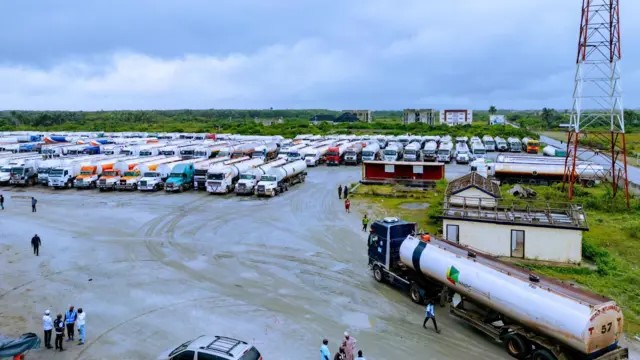
The Federal Government has announced a ban on trucks carrying more than 60,000 litres of hydrocarbon products from loading at depots and operating on federal roads, effective March 1, 2025. Additionally, from the fourth quarter of 2025, no truck exceeding 45,000 litres will be permitted to transport petroleum products.
The Nigerian Midstream and Downstream Petroleum Regulatory Authority (NMDPRA) disclosed this during a briefing in Abuja on Wednesday. Ogbugo Ukoha, the Executive Director of Distribution Systems, Storage, and Retailing Infrastructure at NMDPRA, stated that the decision follows extensive consultations with industry stakeholders in response to the rising number of accidents and explosions caused by overloaded petroleum trucks.
This move comes after the government hinted last week at plans to restrict trucks with a 60,000-litre capacity from federal highways. The decision was prompted by the alarming number of fatalities linked to petrol tanker accidents, which have claimed 493 lives in the past three years.
However, the proposed ban has faced opposition from industry players. Yusuf Othman, President of the National Association of Road Transport Owners (NARTO), warned that the ban could result in the loss of over N300 billion in investments. He noted that more than 2,000 trucks, each valued at over N150 million, would be rendered obsolete.
Despite these concerns, the NMDPRA announced the phased implementation of the ban after a fresh stakeholders’ meeting on Wednesday. The meeting included representatives from NARTO, the Independent Petroleum Marketers Association of Nigeria (IPMAN), the Standard Organisation of Nigeria (SON), the Major Oil Marketers Association of Nigeria (MOMAN), and the Directorate of State Services (DSS), among others.
Ukoha explained that the ban would be implemented in phases to allow stakeholders time to adjust. “Beginning from March 1, 2025, trucks with a capacity exceeding 60,000 litres will not be allowed to load petroleum products at any depot. By the fourth quarter of 2025, we will also prohibit the loading and transportation of petroleum products in trucks exceeding 45,000 litres,” he stated.
He emphasized that the phased approach would give truck owners time to redesign their vehicles and reallocate resources. “Historically, truck capacities have increased from 27,000 to 33,000 to 45,000 litres. In 2020, stakeholders agreed that 45,000 litres should be the cap. However, recent fatalities and road damage have necessitated further action,” Ukoha added.
The NMDPRA director also highlighted the need to balance safety concerns with the economic impact on investors. “While the ban will affect investments, we are engaging stakeholders to ensure a win-win outcome. The staggered implementation allows time for adjustments and minimizes disruption,” he said.
The government’s decision aims to curb the rising incidents of tanker-related accidents, improve road safety, and reduce the strain on federal highways caused by overloaded trucks. The move is part of broader efforts to enhance safety standards in the transportation of petroleum products across Nigeria.
